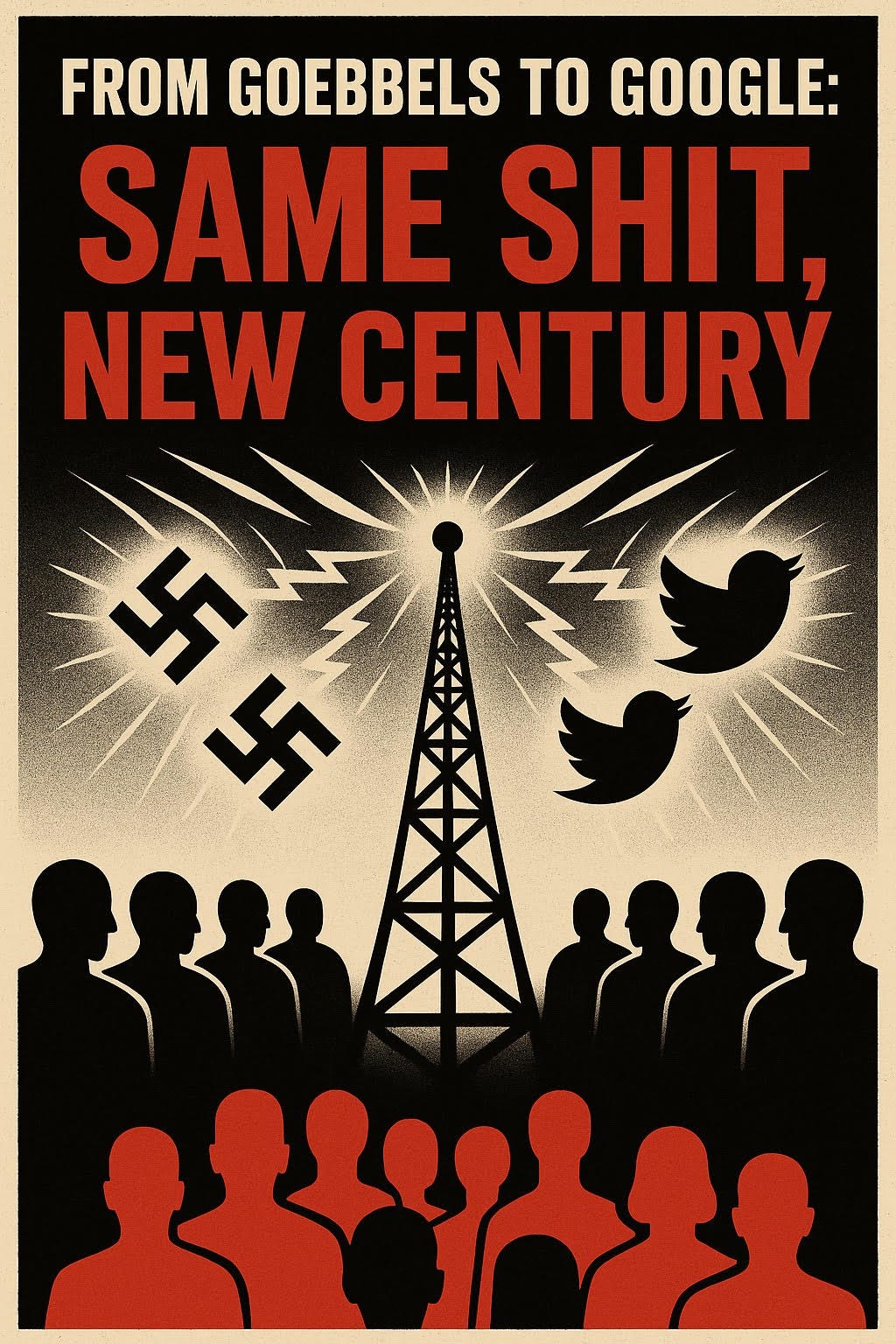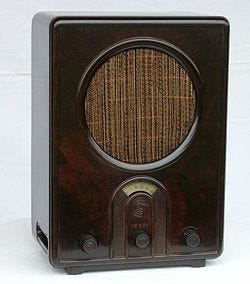From Goebbels to Google:
Shame Shit, Different Century
When people say “social media is destroying our society,” they act like we’ve never been here before. But we have. Exactly one hundred years ago, a new technology burst onto the scene, and within a decade, it had completely altered politics, democracy, and the way people understood reality. That technology was radio, and the Nazis immediately understood its potential to warp minds.
The parallels to today’s social media crisis aren’t just striking—they’re terrifying.
The First Mass Medium of Intimacy
Before the 1920s, mass communication ran through newspapers, pamphlets, and journals. These had editors, fact-checkers, and some degree of accountability. But the radio was different. Suddenly, the most powerful voices in the world could beam directly into people’s living rooms. No mediation. No filter. Just a voice in your ear, in your home.
Joseph Goebbels, the Nazis’ propaganda minister, called radio the “eighth great power.” He wasn’t exaggerating. The Nazis subsidized the Volksempfänger—the “people’s receiver”—so that every household could afford one. Unlike American or British sets, which could tune across a wide band of stations, the Volksempfänger was deliberately limited. Its main function? Make sure the German public heard Nazi propaganda, and heard it constantly. They piped it through cities with speakers.
This wasn’t just about speeches. Hitler’s voice, broadcast at rallies, gave millions the feeling of being part of something larger than themselves. Music, sound effects, and tightly scripted programming turned the Nazi worldview into a lived experience. It bypassed reason and went straight for the gut.
Sound familiar? It should. Because this is exactly what social media does today.
Smartphones Are the New Volksempfänger
Today, everyone carries a propaganda pipeline in their pocket. Instead of Goebbels curating a national feed, algorithms do the job—maximizing outrage, polarization, and emotional resonance. Just like the Nazis, modern authoritarians understand the potential of the medium faster than their opponents.
Donald Trump’s rise wasn’t possible without Twitter. Steve Bannon famously described social media strategy as “flooding the zone with shit.” The goal is the same as it was in Weimar Germany: overwhelm people with emotion, repetition, and scapegoats until facts stop mattering.
The real power of the medium is intimacy. Just as the radio spoke directly into German homes, social media speaks directly into people’s feeds. When you scroll TikTok or Twitter, it feels personal, unmediated, real. That illusion of intimacy is what makes propaganda stick.
And let’s be clear: this isn’t just a “both sides” phenomenon. Yes, bad information circulates everywhere. But the people who exploit it best—the ones who weaponize it—are almost always the authoritarian movements. Just as the Nazis exploited radio better than any democratic party of their day, Trumpism and the MAGA movement exploit social media far more effectively than their opponents.
From Emotion to Radicalization
What makes both radio and social media so dangerous is the way they shift politics from rational discourse to emotional immersion. You don’t just consume propaganda—you feel it. You feel the rage, the grievance, the belonging.
Weimar Germany had a parliament, a free press, even elections. But once the Nazis saturated the culture with propaganda, those institutions couldn’t compete. Citizens who had been immersed in years of Hitler’s speeches and Nazi broadcasts weren’t reachable by facts or debates. They had been reprogrammed.
That’s the danger we face today. Social media radicalization doesn’t just persuade people; it rewires them. When every scroll reinforces fear, resentment, or conspiracy, the emotional lock becomes so strong that facts can’t pry it open.
We see it in vaccine denial. In “Stop the Steal.” In the idea that Democrats are plotting to mutilate children. None of this is grounded in reality, but reality isn’t the point. Emotion is the point. And once people are immersed, they live in an alternate world.
History’s Warning
It’s tempting to think of today’s crisis as unprecedented. It isn’t. The technology is new, but the script is old.
One hundred years ago, radio was supposed to be a force for education and unity. Instead, it became a tool for mass manipulation. Democracies underestimated the threat, while authoritarians weaponized it. The result was catastrophic.
Now, we stand at the same crossroads. Social media could be a force for connection and democracy—but only if we stop pretending the problem is just “mean tweets” or “people being online too much.” The problem is systematic exploitation of a medium that is uniquely suited to propaganda.
And just like the 1930s, the people who exploit it fastest are not the defenders of democracy. They are the ones who want to destroy it.
The Lesson for Us
So what do we do?
The lesson isn’t to abolish the medium. We didn’t abolish radio. But we also can’t keep letting social media operate as an unregulated propaganda machine. We need guardrails, accountability, and a recognition that information itself is a battlefield.
Most of all, we need to recognize propaganda for what it is. Stop treating it like “free speech.” Stop shrugging when lies metastasize. Understand that history already taught us where this road leads.
Conclusion
A century ago, the Nazis taught the world what happens when propaganda takes over the airwaves. By the time people realized what was happening, it was too late.
This time, the stakes are even higher—because the propaganda doesn’t just live on a box in the corner of the room. It lives in our hands, in our feeds, in our heads.
And if we don’t act, history won’t just rhyme. It will repeat.




Wonderful and insightful commentary, many thanks.
The internet needs to be regulated. It can be and I can’t imagine where it’s continued non regulation might bring us next. Terrific article.